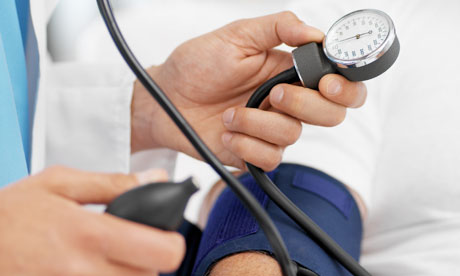
The problem
One in five of us have high blood pressure. It's more common as we get older, fatter and if we drink heavily and smoke. It's more common in those with African-Caribbean ancestry and in people with family members with high blood pressure.
The National Institute for Health and Clinical Excellence (Nice) guidance says that if you're over 40 without risk factors you need blood pressure checks every five years. If you have risk factors then you need annual measurements.
But if you think you'll wait for symptoms before getting tested – forget it. High blood pressure is called the silent killer because you don't get symptoms. Headaches, nose bleeds and dizziness only happen with very high blood pressure. Meanwhile that raised pressure is damaging your heart, kidneys and other organs, increasing your risk of heart attacks, strokes and kidney failure. Your blood pressure measurement depends on how narrow your arteries are and how strongly your heart has to push blood through them round the body. It is measured in millimetres of mercury, written as mmHg and is expressed as two measurements – for instance a normal blood pressure is defined as below 140/90. The first measurement is the systolic pressure – the pressure of the blood in the arteries as the heart beats and pumps out the blood. The diastolic pressure, which is the smaller number written below the systolic, measures the pressure when the heart is resting and re-filling with blood. Treatment for high blood pressure aims to reduce it to under 135/85. For most people there is no cause for their high blood pressure.
The dilemma
You may think it is best to leave well alone. If you feel all right and have no risk factors, isn't there a risk you might get a high reading because being tested is stressful? And won't that set you on a lifetime of tablet taking? And will those tablets really significantly reduce your risk of developing heart disease? If you know the risk factors for high blood pressure, why not pre-empt them by exercising and eating healthily?
The solution
The problem with falsely high readings was addressed by Nice this week, who admitted that measuring blood pressure in the doctor's surgery can give unreliable readings. Up to one in four people diagnosed as having a problem may have what doctor's call white coat hypertension – which means that their blood pressure rises because of stress. Instead, says Nice, people with high surgery readings (over 140/90) should be given ambulatory blood pressure equipment to monitor them twice an hour automatically throughout the day. You wear a blood pressure cuff that automatically tightens and sends a reading to a small device strapped to your arm or round your waist.
If the home reading is over 135/85 then you should have your risk of heart disease calculated by your doctor (using a computer program) and if it's above one in five over 10 years (or you have evidence that your blood pressure has already damaged your heart or kidneys) then you should be offered drugs and advice on dieting and exercise if needed, to reduce your blood pressure to under 135/85.
If you are deciding to take tablets to prevent a stroke or heart attack then you should know how many people would need to be treated to prevent one person developing either condition. But you do need to use this information, called the number needed to treat, with your understanding of personal risk factors such as your family history. A paper on the number needed to treat at www.evidence-based-medicine.co.uk calculates that for people with mild high blood pressure you would need to treat 700 people to prevent one stroke or heart attack in a year. For severe high blood pressure this falls to 15 people. In the over 60s it would be 18.
Since testing is more accurate and the risks and benefits of treatment better known, being tested once you're 40 wouldn't be the most ridiculous thing you've ever done.

